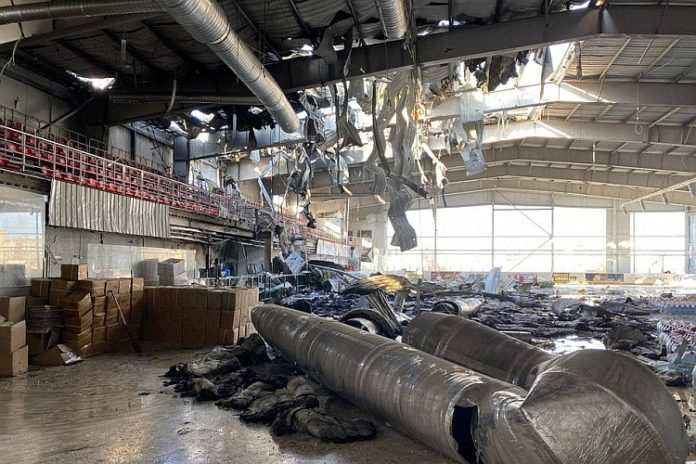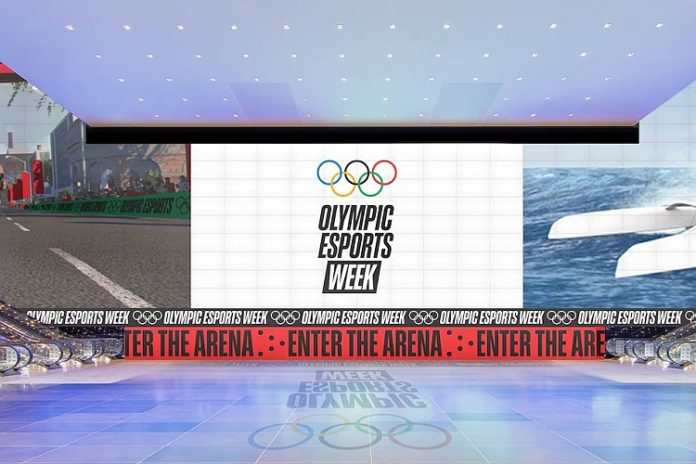★ The Sports Examiner: Chronicling the key competitive, economic and political forces shaping elite sport and the Olympic Movement.★
★ To get The Sports Examiner by e-mail: sign up here! ★
As the Russian invasion of Ukraine continues into a second year, the International Olympic Committee faces another, grave crisis that it did not expect.
The coronavirus descended on an unprepared world and required the Tokyo 2020 Olympic Games to be postponed, and it was eventually held in 2021. The Beijing Winter Games was held, under quarantine, in 2022.
Four days after the closing of that Games, Russia invaded Ukraine in an aggression designed to destroy the Ukrainian state. So far, it has failed badly.
Neither a pandemic or war is accounted for in the Olympic Charter. The medical advances in 2020 and early 2021 allowed the Tokyo and Beijing Games to take place, safely, under stringent conditions.
There’s no such solution for Russia’s war against Ukraine, placing the IOC in – what it readily describes – as an impossible position of trying to figure out a way forward that lives up to its world view as expressed in the Charter.
Doping? Yes. Strictly against it. “Competition manipulation,” especially as regards betting? Yes. Strictly against it. Nothing about war.
There is the Declaration of Athletes Rights and Responsibilities from October 2018, which includes Athlete’s Right no. 7:
“The protection of mental and physical health, including a safe competition and training environment and protection from abuse and harassment.”
And there is Athlete Responsibility no. 5:
“Respect the rights and well-being of, and not discriminate against, other athletes, their entourage, volunteers and all others within the sporting environment, and refrain from political demonstration in competitions, competition venues and ceremonies.”
In the same document, the IOC says Ukrainian athletes have had their rights violated – including by murder by a foreign power – and then says it has to respect athletes from that country on the field of play.
So, in a hypothetical 1944 Olympic Games in London – which was selected in June, 1939 prior to the Nazi invasion of Poland in September – today’s IOC would have insisted that German and Japanese athletes compete as “neutrals” alongside Soviet, British and American teams. And refugee teams from countries like China and Poland, where the Japanese and Germans had already murdered millions, would also be asked to compete and “refrain from political demonstration” in competitions and ceremonies.
What kind of cruel, twisted joke is that, even hypothetically?
And that is exactly the possibility that the IOC is considering for the Paris 2024 Olympic Games with its discussion of “neutral” athletes from Russia and Belarus, rejected out of hand by Ukrainian athletes and officials in a Wednesday story from The Associated Press.
And screams of Nazism are not far from this conflict, as Russian leader Vladimir Putin has relentlessly used the term on Ukraine, which was part of the USSR forces against Nazi Germany in World War II.
An impressive AP story from 23 February highlighted 2,000 intercepted telephone calls home from Russian soldiers at the front in Ukraine. It noted:
“Maxim and his mother discuss the opposing narratives about the war on Ukrainian and Russian television. They blame the U.S. and recite conspiracy theories pushed by Russian state media.
“Maxim and his mother believe that it’s the Ukrainians who are deluded by fake news and propaganda, not them. The best way to end the war, his mother says, is to kill the presidents of Ukraine and the U.S.”
Maxim’s mother told her son, based on state television reporting, “It’s the Americans driving this, of course! Look at their laboratories. They are developing biological weapons. Coronavirus literally started there. … Biden’s son is the mastermind behind all of this.”
That’s the reality of Russia, and it is promoted continuously into the sports milieu. At Wednesday’s “We are together. Sport” conference in Moscow, Deputy Prime Minister Dmitry Chernyshenko told attendees:
● “We have seen how, at the behest of the Anglo-Saxons, all international organizations, starting with the IOC, began to put obstacles to the participation of our athletes in international sport competitions, and they continue to do so.”
● “We faced double standards in sports at international competitions after the stunning success in Sochi [Winter Games 2014], which they could not forgive us for. There was a lot of mythology, they tried to make us look like a country that built its victories on doping. There were a lot of lies, manipulations and traditional methods used by countries unfriendly to us.”
● “We have a lot of international competitions this year despite the fact that countries unfriendly to us are trying to exclude us from the world sport system. But they didn’t succeed; we see that in the Friendship Games and the All-Russian Spartakiade, the Games of the Future, the Children of Asia and many other competitions take place no matter what. Countries come, some of them with apprehension, though, because they are afraid of sanctions.
“But we know that time will put everything in its place, we know that no international competition is complete without our athletes.”
That’s the Russian view of the ban on international competitions being held in the country and on the IOC’s requested ban on its athletes (and Belarusians).
It has been widely surmised that the IOC’s demands for “neutrality” – no national symbols, flags or anthems, and no evidence of direct support for the war – will be enough for Russia to refuse to participate, in whatever fashion, in Paris next year.
Don’t be so sure. On Thursday, the Russian news agency TASS carried this from 1996 Olympic Rhythmic Gymnastics All-Around silver medalist Yana Batryshina, now 43:
“Our athletes have to go to the Olympics. With a neutral flag, without a flag at all, without a uniform, but go. Because so much effort and work was put into participating in the Games, for the sake of realizing one’s dream. I’m ready to grab by the scruff of my neck and shake anyone who thinks a neutral flag is a betrayal of the country.
“I can’t listen to these people who don’t understand what the Olympics mean to athletes. And with such words they just kill the athletes, tear their hearts apart.”
And what about the choices that having “neutral” Russian and Belarusian athletes in competition creates for athletes from not just Ukraine, but those everywhere who detest the Russian aggression, destruction and murder that threatens to overshadow Paris 2024?
This discussion was front-and-center in front of the Beijing 2022 Winter Games over China’s treatment of the Xinjiang Uyghurs – remember them? – until a Russian doping scandal over teen figure skater Kamila Valieva hijacked everyone’s attention. Remember Charter Rule 50.2:
“No kind of demonstration or political, religious or racial propaganda is permitted in any Olympic sites, venues or other areas.”
So now the impossible choices loom before athletes who didn’t ask to be put in a compromising moral and political situation.
Now, the IOC is forcing them to ask what is their responsibility to peace when they are supposed to be concentrating on competition.
There’s no doubt about the culprit. United Nations Secretary General Antonio Guterres (POR) told the U.N. Council of Human Rights – whose volunteer rapporteurs applauded the IOC’s support of Russian re-entry – last week:
“The Russian invasion of Ukraine has triggered the most massive violations of human rights we are living today.
“It has unleashed widespread death, destruction and displacement.”
In March 2021, with chatter about a boycott of the Beijing Winter Games over China’s human-rights violations circulating, American skiing superstar Mikaela Shiffrin told CNN:
“The Olympics is big, and it’s something that you shoot for, and you don’t want to miss it.
“And you certainly don’t want to be put in the position of having to choose between human rights, like morality versus being able to do your job, which on the other hand can bring light to some issues or can actually bring hope to the world at a very difficult time.”
If Russian and Belarusian athletes – who are nearly all (if not all) supported by their governments and often members of police or military units – are allowed to compete in Paris, it will create a brutal, unpleasant and what should be an unnecessary choice for 10,000 other athletes.
What is the IOC’s responsibility to them – the 10,000 – as those athletes consider their bitter options, amid the requirements of Rule 50 and the “Olympic spirit, which requires mutual understanding with a spirit of friendship, solidarity and fair play”?
Rich Perelman
Editor
You can receive our exclusive TSX Report by e-mail by clicking here. You can also refer a friend by clicking here, and can donate here to keep this site going.
For our updated, 929-event International Sports Calendar for 2023 and beyond, by date and by sport, click here!






















